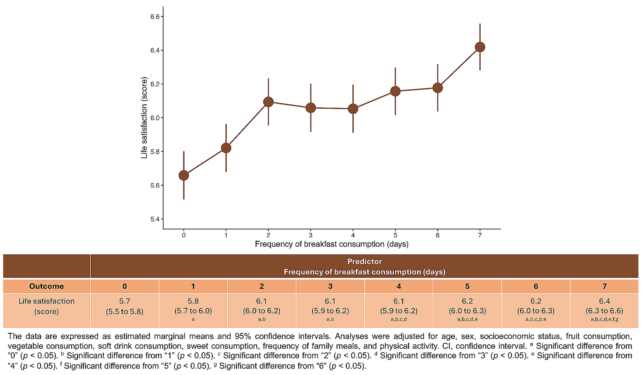Breakfast is celebrated by many As the most important meal of the day.
To keep school going children happy, it can be great. According to a study of nearly 150,000 children and adolescents worldwide, those who ate breakfast reported a happier lifestyle than those who skipped it.
The participants were between the ages of 10 and 17, and were from 42 different countries, including Russia, England, Scotland, Canada, and many other countries in Europe and the Middle East.
In one questionnaire, individuals were asked, “How often do you usually eat breakfast (more than milk or fruit juice)?” They answered school days and weekends.
The group was then asked to rate their perceived quality of life on a scale of 0 to 10, with 10 being the “highest imaginable quality of life” and 0 being the “worst imaginable quality of life.” represents
When the unknown results were plotted on a graph, where one axis was breakfast frequency and the other was observed quality of life, a nearly straight line appeared between the data points.
The result was clarified after an international team of researchers controlled for potential contributing factors such as gender, age, socioeconomic status, fruit and vegetable consumption, sugar consumption, family meal frequency, physical activity and body mass index.
At the top of the line were participants who said they ate breakfast every day, no matter if it was a school day or a weekend. This group had the highest life satisfaction scores with 6.3 to 6.6 points.
At the end of the line were those who never ate breakfast. They showed the lowest life satisfaction scores with 5.5 to 5.8 points.

“The results showed some differences between countries, which may be influenced by diverse cultures and lifestyles and socio-economic factors.” notes Senior author Lee Smith, an epidemiologist from Anglia Ruskin University in the UK.
“However, our results show that in all the countries examined, life satisfaction is reported to be higher overall for those who eat breakfast every day than for those who never eat breakfast. “
The findings are consistent with a study of more than 70,000 children in Australia, which found that skipping breakfast was associated with lower life satisfaction in both 8- to 18-year-old boys and girls.
Whether this association was derived specifically from skipping breakfast, or skipping meals altogether, was unknown. But many studies have shown that a nutritious breakfast is associated with many mental and physical health benefits. Physical health, including improved memory, cognitive function, and physical activity.
It is important to note that the results are based on community studies, which means that breakfast consumption itself may not be the cause. It’s also possible that whatever is causing you to skip breakfast has other negative consequences.
However, a study from Korea found that the more frequently a child eats breakfast, the more their “somatic” symptoms such as breathing rate, fatigue, sleepiness.Itching, nausea, appetite, headache and fever are also reduced.
And these privileges may not only apply to young people.
In 2022, a A meta-analysis found that skipping breakfast was positively associated with increased anxiety, stress and psychological distress. all age groups, but especially for under 18s.
“The scientific literature has consistently highlighted links between skipping breakfast and negative moods in young adults,” write lead author José Francisco López Gil and his colleagues.
“However, breakfast frequency has not been examined in relation to perceived life satisfaction in young adults.”
The result is that no one really knows why breakfast is so closely related to the mood of young people.
“Consuming an adequate breakfast provides the energy and nutrients needed for optimal cognitive performance and improves concentration, memory and learning ability.” explains Smith.
“Another reason may be the mix of vitamins and minerals we get from our daily breakfast, and not getting them regularly may reduce life satisfaction over time. A regular routine that includes breakfast Can bring structure and relaxation to the day.”
This is one food that young people don’t want to give up.
The study was published in 1993 BMC Nutrition Journal.
#Children #eat #breakfast #day #share